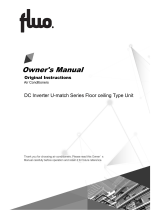
Safety Precautions
ENGLISH
Installation Manual 5
• Do not install, remove, or re-install the unit by yourself (customer).
- There is risk of fire, electric shock, explosion, or injury.
• Be cautious when unpacking and installing the product.
- Sharp edges could cause injury. Be especially careful of the case
edges and the fins on the condenser and evaporator.
• For installation, always contact the dealer or an Authorized Service
Center.
- There is risk of fire, electric shock, explosion, or injury.
• Do not install the product on a defective installation stand.
- It may cause injury, accident, or damage to the product.
• Be sure the installation area does not deteriorate with age.
- If the base collapses, the air conditioner could fall with it, causing
property damage, product failure, and personal injury.
• Do not turn on the breaker or power under condition that front panel,
cabinet, top cover, control box cover are removed or opened.
- Otherwise, it may cause fire, electric shock, explosion or death.
• Use a vacuum pump or Inert (nitrogen) gas when doing leakage test or
air purge. Do not compress air or Oxygen and Do not use Flammable
gases. Otherwise, it may cause fire or explosion.
- There is the risk of death, injury, fire or explosion.
• Have all electric work done by a licensed electrician according to
"Electric Facility Engineering Standard" and "Interior Wire Regulations"
and the instructions given in this manual and always use a special
circuit.
- If the power source capacity is inadequate or electric work is
performed improperly, electric shock or fire may result.
• Always intstall a dedicated circuit and breaker.
- Improper wiring or installation may cause fire or electric shock.
• The appliance shall be stored in a well-ventilated area where the room
size corresponds to the room area as specified for operation. (for R32)
• Ducts connected to an appliance shall not contain an ignition source.
(for R32)
• The appliance shall be stored in a room without continuously operating
ignition sources (for example: open flames, an operating gas appliance
or an operating electric heater.)
• Keep any required ventilation openings clear of obstruction.
• Mechanical connections shall be accessible for maintenance purposes.
• To prevent the mixing of different types of refrigerants, be sure to check
the type of refrigerant used in the outdoor unit.




















